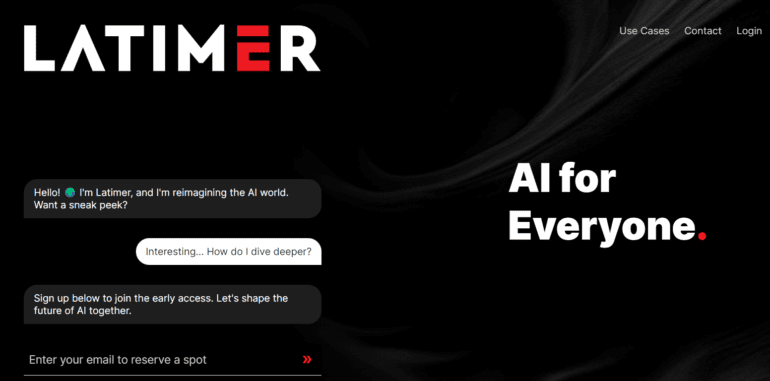TL;DR:
- Latimer introduces “Black GPT” platform for more inclusive Large Language Models (LLMs).
- The platform incorporates African American historical and cultural data, aiming to reduce bias.
- Partnerships with HBCUs and collaboration with scholar Molefi Kete Asante strengthen Latimer’s mission.
- Wellville founder Esther Dyson supports Latimer’s goal of representing the world more accurately.
- Latimer focuses on inclusive AI tools for students, agencies, brands, and the public, with HBCUs adopting the platform.
- Latimer’s approach promises to reshape the AI landscape with a more diverse and nuanced representation of human experience.
Main AI News:
Latimer, a trailblazer in the field of Large Language Models (LLMs), is embarking on a mission to revolutionize inclusivity within the AI landscape. The unveiling of their innovative platform, aptly named “Black GPT,” signifies a significant leap towards a more racially inclusive LLM experience. Within this groundbreaking platform, the rich cultural and historical narratives of Black and Brown communities are intricately interwoven.
Building upon the foundation laid by Meta’s model, Latimer incorporates vital African American historical and cultural data into its LLM. This visionary approach has already garnered substantial interest, leading Latimer to forge partnerships with esteemed institutions such as Miles College and other Historically Black Colleges and Universities (HBCUs). Additionally, Latimer is at the forefront of The Yard Tour, an on-campus innovation event series that caters to HBCUs across the nation.
John Pasmore, Founder and CEO of Latimer, emphasizes the company’s commitment to shaping the future of AI. He states, “We are laying the groundwork for the AI landscape of tomorrow, with a focus on fostering inclusivity. Our objective is to develop a technological framework that can be harnessed by individuals from all walks of life. The enthusiasm and eagerness to embrace this transformative technology, led by some of the most eminent figures across various industries, is truly unprecedented.”
Latimer’s approach to training their LLM is multifaceted. It not only addresses and mitigates bias, a common challenge in the use of such tools, but also incorporates comprehensive training on Black and Brown histories. To achieve this, Latimer has collaborated with the distinguished American scholar and professor Molefi Kete Asante. Asante, renowned for his contributions to African-American studies, African studies, and communication studies, is currently a professor in the Department of Africology at Temple University, where he initiated the PhD program in African-American Studies.
Notably, Latimer has garnered support from key figures within the tech/AI industry, including journalist and Wellville founder Esther Dyson, who is the company’s inaugural investor. Dyson’s investment underscores the importance of ensuring LLMs accurately reflect the diverse world we live in. She asserts, “Large Language Models are poised to become ubiquitous, if they haven’t already, but they often mirror an imperfect reality. While we can’t change the world, we can certainly enhance its representation, reducing cultural biases and reevaluating history from different perspectives. Latimer is stepping into a crucial role, not only for a user base whose history and culture deserve authentic representation but for the global audience, which deserves a more nuanced and balanced view of the world, with all its complexities.“
At present, Latimer’s primary focus is on delivering an inclusive AI tool tailored for students, agencies, brands, and the general public. Recognizing the urgent demand for a more encompassing AI solution, numerous HBCUs are swiftly adopting Latimer’s platform to benefit their students. The consumer waitlist for this groundbreaking platform is now open, promising an even broader impact.
Bobbie Knight, President of Miles College, emphasizes the urgency of equipping students with AI proficiency. She remarks, “Our students must not only become proficient users of AI but also adept builders of it. Collaborating with Latimer opens up invaluable learning opportunities, enabling our students to grasp this technology faster than we can develop a curriculum around LLMs.”
Conclusion:
Latimer’s groundbreaking efforts in fostering equity and inclusivity within AI represent a significant shift in the market. Their innovative “Black GPT” platform, coupled with strategic partnerships, positions them to meet the growing demand for more culturally aware and diverse AI solutions. This move not only addresses historical biases but also reflects a broader industry trend toward more inclusive technology. As Latimer continues to shape the future of AI, it sets a compelling precedent for the market’s evolution toward greater diversity and fairness.

